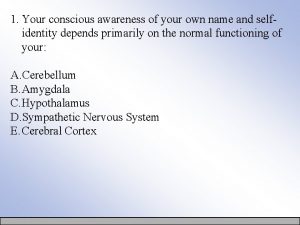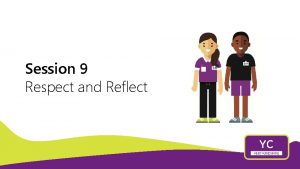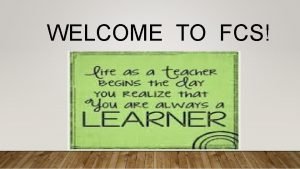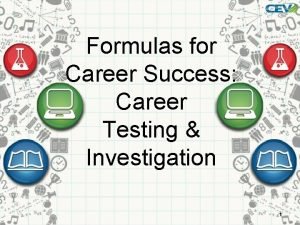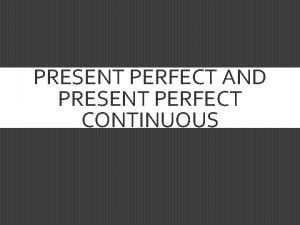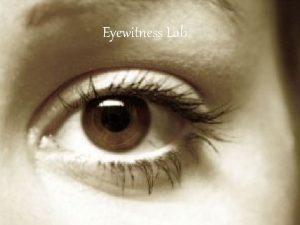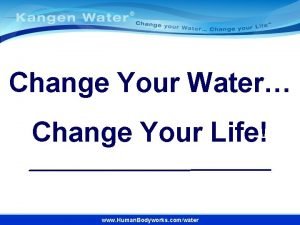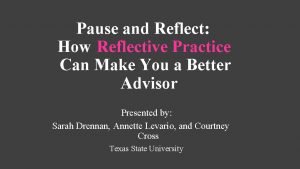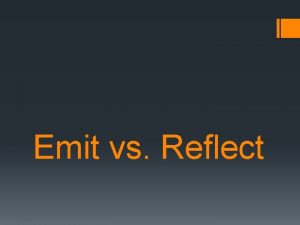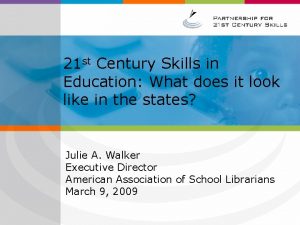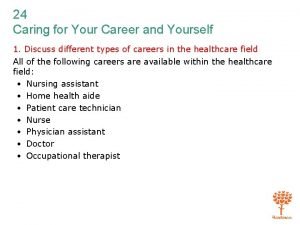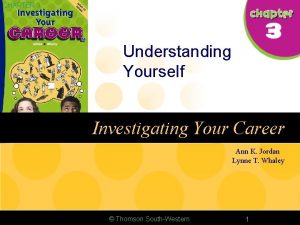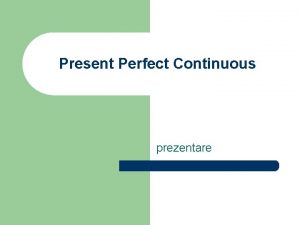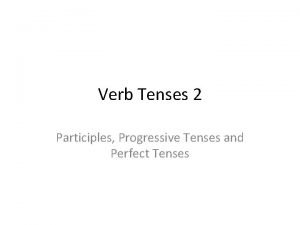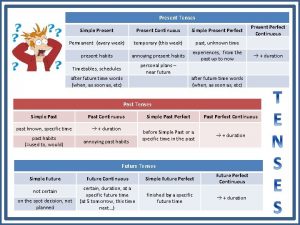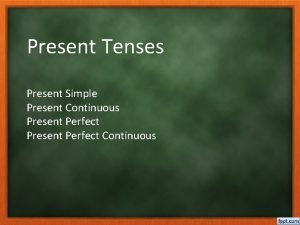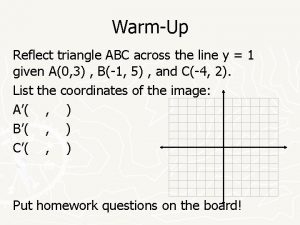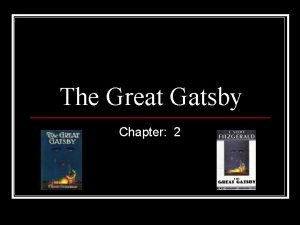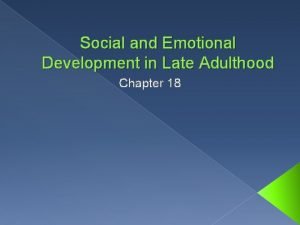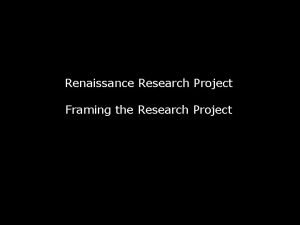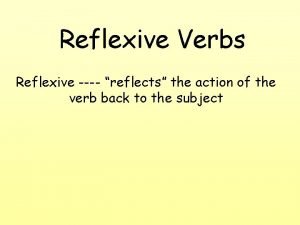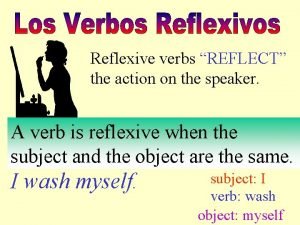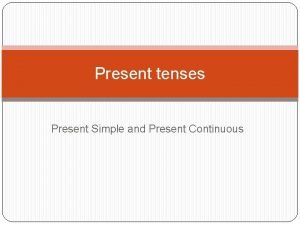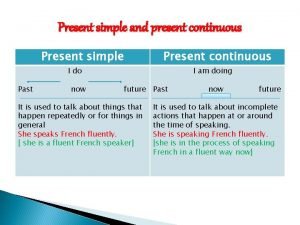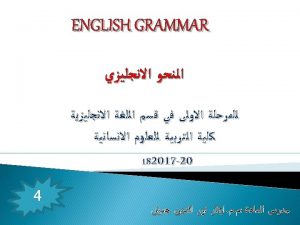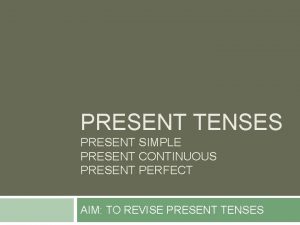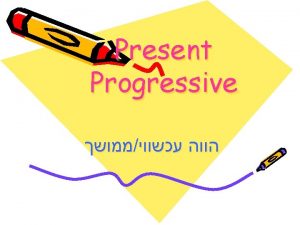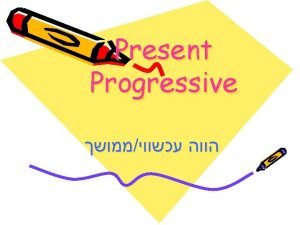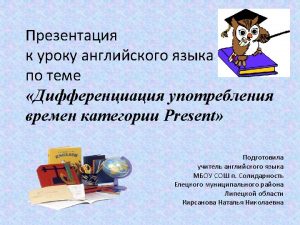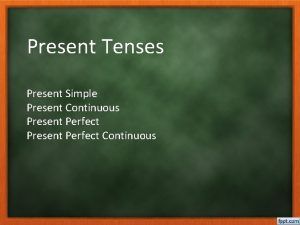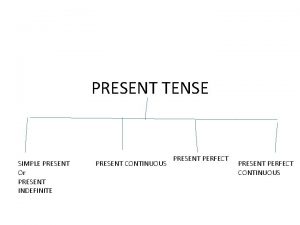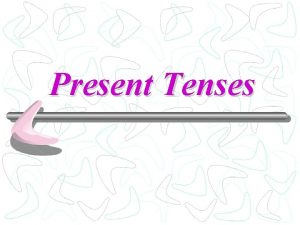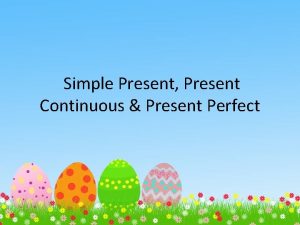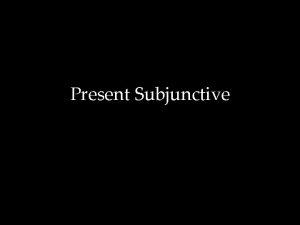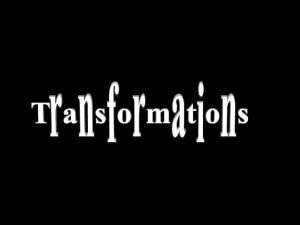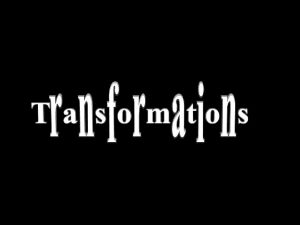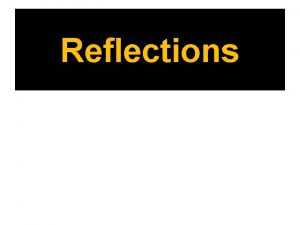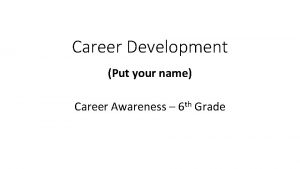Life Career Awareness Reflect on your present and











![Taxonomy for learning outcomes Bloom’s Model of Cognitive Goals [Bloom 1956] Slide modified from Taxonomy for learning outcomes Bloom’s Model of Cognitive Goals [Bloom 1956] Slide modified from](https://slidetodoc.com/presentation_image/7f8e6958ece6606327372eff4465d6b1/image-12.jpg)














- Slides: 26

Life & Career Awareness = "Reflect on your present and future life " The purpose of reflecting on ones life is to take time to formulate - beyond classroom - what matters to you and why it's important to you: How to live Wisely – NYT What does it mean to live a good life? What about a productive life? How about a happy life? How might I think about these ideas if the answers conflict with one another? And how do I use my time here at college to build on the answers to these tough questions? " http: //www. nytimes. com/2015/08/02/education/edl ife/how-to-live-wisely. html? smprod=nytcoreiphone&smid=nytcore-iphone-share&_r=0 • What is important to you? • What do you need to learn to be able to achieve what's important to you? • How do you learn the best way? • How do you live today to achieve what's important just for you? • How do you contribute to the learning process in the group, what role do you have ("your diamond") and what do you need to practice (your challenge)? • How do you make us of your time at the uni, interaction with fellow students and your proffs?

The Reticular Activating System (RAS)

Schools for Wisdom! The developing high tech and info society we are living in put new demands on the education system. What matters professionally is the quality of knowledge and mindset that contribute with their expertise to the groups they work within. To educate wise professionals and persons education systems needs to support students to: 1. Get knowledge of basic facts. 2. Identify patterns that connect facts in a meaningful way. 3. Retrieve information to knowledge, make knowledge alive. 4. Leave the school and live with thier knowledge and for several years expose themselves to the stresses of reality and thus transform knowledge into wisdom. http: //www. nytimes. com/2015/10/16/opinion/schools-for-wisdom. html? smid=li-share&_r=0

Product Development for Game Staff! Lina Sors Emilsson lina. emilsson@angstrom. uu. se Pascalina Suciu pascalinasuciu@gmail. com The cours is administrated via “studentportalen” (SP) 4

Presentation of course participants & teachers • Take 3 min and discuss in groups of 4 what you think is the most important information your profs need to have about you and the group to be able to provide to a developing and challenging course. One person per group will present. • Take 3 min and discuss what you think is the most important information your students need to have to be able to provide to a developing and challenging course. One person 5 per group will present.

Pedagogical approach Students = Neurons

Memory and learning Sensory activation Expanding network Network development Increased activity

The Environment affects the anatomy of the brain and function Standard environment Enriched environment Fatima Memic - Brain Struct Funct. 2015 Nov; 220(6): 3435 -48 - Nature Reviews Neuroscience. 2006 Sept; 7: 697 -709. - A critical window for recovery after stroke | John Krakauer | TEDx

Key functions for function/knowledge Intnesity • • • Repetition Duration Distribution Frequency Effort Challenging level Psychological factors • Motivation Maner • Formulated goals • Specificity/ Funktionality • Variabiability • Form Information • Instructions • Feedback Bilder modifierade från IISART Utbildningsmaterial - http: //www. iisartonline. org/services/education-material/

Add value to the process of learning • Learning is promoted through awareness of evaluation processes and assessment criterias. • Require communication not only information. • Individuals who are not involved will learn less and are more likely to overestimate their performance. • Feedback Chris Rust, Margaret Price & Berry O’Donovan. (2003). Improving Students’ Learning by Developing their Understanding of Assessment Criteria and Processes. Assessment & Evaluation in Higher Education, Vol. 28, No. 2, 147 -164

Add value to the process of learning Objectives What should the student be able to do after the course? learning activities Support for Learning. What do the students need to achieve the objectives? Assesment What should the students do to demonstrate that they have achieved the objectives? Slide modified from lecture by Tomas Grysell
![Taxonomy for learning outcomes Blooms Model of Cognitive Goals Bloom 1956 Slide modified from Taxonomy for learning outcomes Bloom’s Model of Cognitive Goals [Bloom 1956] Slide modified from](https://slidetodoc.com/presentation_image/7f8e6958ece6606327372eff4465d6b1/image-12.jpg)
Taxonomy for learning outcomes Bloom’s Model of Cognitive Goals [Bloom 1956] Slide modified from lecture by Tomas Grysell

Pedagogic approach Ambition: Provide basic information about product development, team work, interdisciplinary cooperation's, project leading, critical thinking, written, video and oral documentation and presentations. Through: - Continuous deadlines and theory evaluations - Seminars / workshops - Group work - Final examinations that are reality & problem-based. All aspects of this course is designed to raise each student to 13 her or his (hen’s) best ability based on ambitions.

Product Development for game An approach to your work Learn a scientific process! Plan – Execute – Analyse – Evaluate – Optimise REPEAT!

Course goals At the end of the course, the student will be able to: 1. account for and apply the most common tools in the innovation process based on the development of game-related products, 2. put forward, motivate and apply methods to collect the customers’ needs and requirements concerning the product, 3. describe the importance of services in product development, 4. apply tools in service management, 5. account for differences between product and innovation development in small and large organizations, 6. implement basic economic calculations with the aim of optimizing production factors.

Schedule – In total 360 h = 20/Week Every week will have a looping schedule, with a total of 20 h/week: Monday – 1 h Individual studies and submit your question for the coming Tuesday and your weekly theory examination. Tuesday – seminars/workshops (2 h), group work (4 h) and prof. time for theory examination and project work coaching (1 h), in total 7 h - 10: 00 to 12: 00 Seminar or workshop – 2 h - In the afternoon (13: 00 to 17: 00) group work - Every group will also have a meeting (1 h) with a tutor, 20 -25 min will include individual weekly evaluation of course theory where every student will present her or his question along with their answer to their formulated question, as well as 20 -25 min of group project coaching. Every group (A-D) have a pre-scheduled time for every week, see schedule in “student portalen”. - Group work – 4 h Group room are booked for course participants. Wednesday – 4 h individual studies Thursday - 1 h individual studies Friday – Group work 7 h. Group room are booked for course participants. Please note that some weeks do not follow the above scheme, e. g. the two first weeks of the 16 course where especially September 5 is a full day of mandatory workshop, 8 h.

Seminar and workshops 17

Theory Evaluation of individual knowledge regarding theory will be conducted continuously through weekly examinations where: 1. all course participants will hand in a question every Monday related to product development and include references for the literature that have been read. The reference needs to be validated by a scientific strategy that can be evaluated. Deadline every Monday at 23: 59 between Sept 1 and Dec 4. Furthermore you are welcome to read and make question about whatever interest you in the field of product development or you can use below introduced themes. Don’t forget to give reference. 2. all course participants needs to be prepared to present and answer the question (max 3 min person + 2 min questions) they have formulated every Tuesday to their fellow group members and a tutor. Deadline every Tuesday between Sept 12 and Dec 5. Please note that on Sept 12, the discussed questions will be the ones submitted both on Sept 1 & Sept 7.

Theory 19

Group work – Start Sept. 12 Ends Jan 12 Prepare for a “hands on” experience. . that will bring you from the need of a population/audience at Gotland (referred to as case owners) to an innovative solution (marketable product) that can be used and implemented by different or one interest group/s (private or public organizations/companies) at Gotland. Teams! 20

Assessments Grade F, P & Pw. D 1. Seminar & Workshops – Every week (F or P) 2. Theory based questions & presentations – Every week (F, P or Pw. D) 3. Group work – Every week (F or P) 4. Oral group presentation – December 19 (F or P) 5. Video pitch – January 12 (F or P) 6. Individual written product presentation – January 12 (F, P or Pw. D) If one fails to be present during a seminar or a workshop or theory evaluation one has to hand in a written assignment that will be provided by the professor.

Criteria & Goals Expresses the quality of the understanding, skills and abilities that course participants are demonstrating Grade F, P, Pw. D

Evaluation criteria’s - not text-related Passed (P): The person can formulate clearly, in a wellstructured manner and, through a professional language (including correct and appropriately used professional and technical terms) explain and summarize the facts. Passed with Distinction (Pw. D): In addition to the criteria set for grade P, the person has a further clarity and structure in her or his reasoning, where no irrelevant information is included. Reasoning regarding conducted work should be based on facts and clearly indicate what is the most important information and why that is. 23

Evaluation criteria’s - text-related Pass requires that below criteria are met. Pass with distinction requires that the criteria are met to a high degree. 1. Analysis and discussion: Coherent argumentation, with relevant arguments that are supported by the literature and/or other relevant sources. Relevant different perspectives and interpretations are analyzed and discussed. The student shows capacity of independent analysis and critical reflection on referenced material. 2. Connection to theory and literature: Correct and relevant connection to core/central theoretical frameworks. There are relevant references to the literature and/or other relevant peer-reviewed sources. Key perspectives and viewpoints are discussed. 3. Originality and creativity: Expression of original connections between (and/or development of) different (scientific) perspectives and experiences. The student argues for her/his opinions and choices. 4. Completeness, clarity and precision: The language is clear, professional and comprehensible. References and other formal aspects of the text are in accordance with the requirements of the assignment. The course goals that the assignment 24 relates to are met. The student answers the question(s) fully.

Mandatory to pass the In this course are below course sections mandatory 1. Hand in theory based questions on Mondays. 2. Workshop/lectures on Tuesdays. 3. Theory examination on Tuesdays with each group individually. 4. Group meeting with Prof on Tuesdays. 5. Group work, Tuesdays and Fridays. 6. Oral group presentation of the product Dec 19. 7. Submit a video pitch of the product on Jan 13. 8. Submit a written product report on Jan 13. 25

Four questions 1. What do you want to work with when you have your degree? 2. What role do you think a project manager has in the process of developing a customer-centered product? 3. What do you think is important for you to learn in relation to customer-centered product development? 4. How do you prefer to acquire knowledge? Reach questionair through this link: https: //doit. medfarm. uu. se/kurt/? action=view&id=10621 &role=receiver
 Cvs privacy awareness training answers
Cvs privacy awareness training answers Your conscious awareness of your own name
Your conscious awareness of your own name How does literature reflect life
How does literature reflect life Reflect your respect
Reflect your respect National fcs standards
National fcs standards Formulas for career success: résumés - assessment
Formulas for career success: résumés - assessment Present simple present continuous and present perfect
Present simple present continuous and present perfect Test your awareness whodunnit answers
Test your awareness whodunnit answers Change your water change your life
Change your water change your life Pause and reflect examples
Pause and reflect examples Emit vs reflect light
Emit vs reflect light Give us your hungry your tired your poor
Give us your hungry your tired your poor Life and career skills
Life and career skills Chapter 31 caring for your career and yourself
Chapter 31 caring for your career and yourself Chapter 24 caring for your career and yourself
Chapter 24 caring for your career and yourself Present perfect present simple present continuous
Present perfect present simple present continuous Present perfect continuous affirmative
Present perfect continuous affirmative Present perfect simple schema
Present perfect simple schema Simple present present perfect present progressive noredink
Simple present present perfect present progressive noredink I do i did
I do i did Present simple present continuous present perfect
Present simple present continuous present perfect Counterclockwise rotation 270 degrees
Counterclockwise rotation 270 degrees Chapter 2 great gatsby summary
Chapter 2 great gatsby summary Peck's theory of ego integrity
Peck's theory of ego integrity Which language
Which language Reflexive verb chart
Reflexive verb chart Viste infinitive
Viste infinitive

